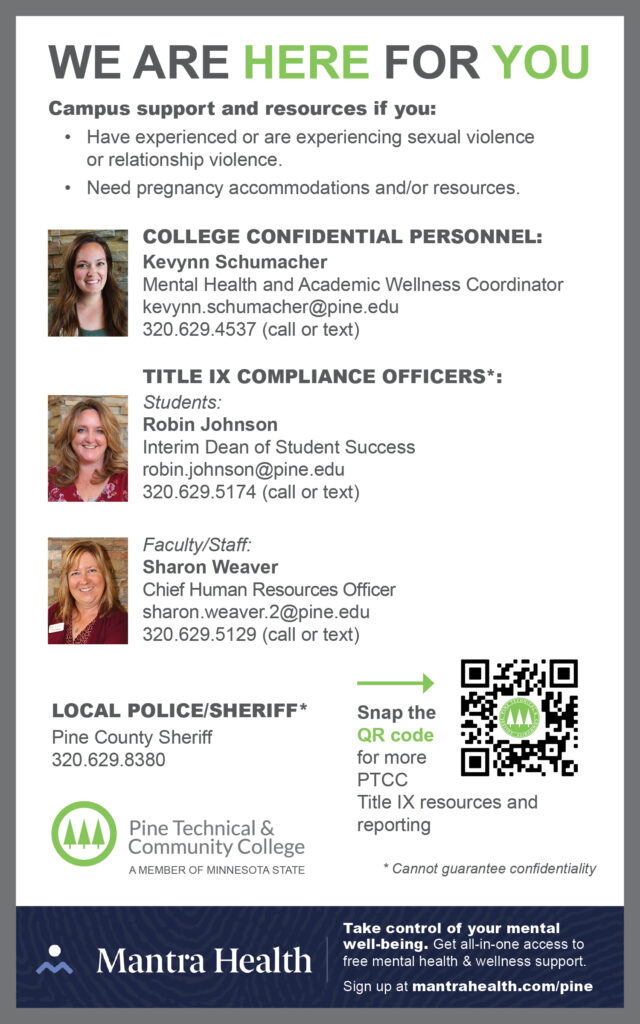Any sexual act directed against another person, against that person’s will or where the victim is incapable of giving consent.
Includes rape, sodomy, sexual assault, and fondling. Incest is sexual intercourse between persons who are related to each other within the degrees wherein marriage is prohibited by law. Statutory rape is sexual intercourse with a person who is under the age of consent.
“Sexual assault” means an actual, attempted, or threatened sexual act with another person without that person’s consent. Sexual assault is often a criminal act that can be prosecuted under Minnesota law, as well as form the basis for discipline under Minnesota State Colleges and Universities student conduct codes and employee disciplinary standards. Sexual assault includes but is not limited to:
- Involvement without consent in any sexual act in which there is force, expressed or implied, or use of duress or deception upon the victim. Forced sexual intercourse is included in this definition, as are the acts commonly referred to as “date rape” or “acquaintance rape.” This definition also includes the coercing, forcing, or attempting to coerce or force sexual intercourse or a sexual act on another.
- Involvement in any sexual act when the victim is unable to give consent.
- Intentional and unwelcome touching, or coercing, forcing, or attempting to coerce or force another to touch a person’s intimate parts (defined as primary genital area, groin, inner thigh, buttocks, or breast).
- Offensive sexual behavior that is directed at another such as indecent exposure or voyeurism.
Rape
The penetration, no matter how slight, of the vagina or anus with any body part or object, or oral penetration by a sex organ of another person without the consent of the victim.
Domestic Violence
Violent misdemeanor or felony offense against a current or former spouse or cohabitant, or anyone who would be protected by domestic or family violence laws.
Dating and Relationship Violence
Violence against a person in a romantic or intimate relationship. Dating and relationship violence includes physical harm or abuse, and threats of physical harm or abuse, arising out of a personal intimate relationship. This violence also may be called domestic abuse or spousal/partner abuse and may be subject to criminal prosecution under Minnesota state law.
Stalking
Behavior that would cause a reasonable person to fear for their or others’ safety, or behavior that causes substantial emotional distress. Stalking is conduct directed at a specific person that is unwanted, unwelcome, or unreciprocated and that would cause a reasonable person to fear for her or his safety or the safety of others or to suffer substantial emotional distress.
Sexual Harassment
Unwelcome sexual advances, requests for sexual favors, and other unwanted conduct of a sexual nature.
Consent
Consent requires words or conduct indicating a freely given agreement to participate in sexual activities. Consent does not mean the existence of a prior or current relationship between people or that one failed to resist a particular sexual act. A person who is incapacitated or physically helpless cannot consent to a sexual act. Consent is informed, freely given and mutually understood. If coercion, intimidation, threats, and/or physical force are used, there is no consent.
If the complainant is mentally or physically incapacitated or impaired so that the complainant cannot understand the fact, nature, or extent of the sexual situation, there is no consent; this includes conditions due to alcohol or drug consumption, or being asleep or unconscious. Silence does not necessarily constitute consent, and past consent of sexual activities does not imply ongoing future consent. Whether the respondent has taken advantage of a position of influence over the complainant may be a factor in determining consent.
Non-forcible Sex Acts
Non-forcible acts include unlawful sexual acts where consent is not relevant, such as sexual contact with an individual under the statutory age of consent, as defined by Minnesota law, or


